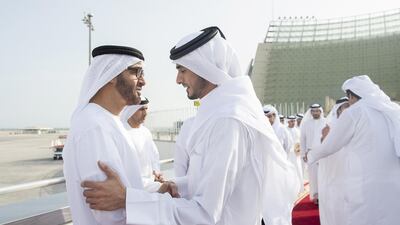Ten days after the leaders of the Gulf Cooperation Council (GCC) met in Riyadh to patch up their differences, the Emir of Qatar took the reconciliation further by inviting the leadership of the UAE to Doha for talks.
On Friday, Sheikh Mohammed bin Zayed, the Crown Prince of Abu Dhabi, flew to Doha to discuss various matters with Sheikh Tamim bin Hamad. The meeting draws a line under what has been a tense year for members of the GCC, and signals that, as the next GCC summit approaches, the region can once show the world that it is united. Sheikh Mohammed hit the nail on the head when he said that unity is the key for the region’s security and stability.
That is a positive development, on both personal and political levels. The photograph of Sheikh Tamim bin Hamad and Sheikh Mohammed bin Zayed walking together from the plane, hands clasped, was widely shared on social media over the weekend by Gulf citizens and residents. It underlined that the political very often is the personal. And vice versa. More than anything, it was this photograph that showed the importance of the friendship between the people of the Gulf states.
We have made the point before that the citizens of the GCC states are, quite literally, brothers: there are strong ties of family, friendship and business across the borders of the Gulf states. When there is political tension within the GCC, it affects people who live in the region in much the way that a family disagreement causes pain.
Politically, reconciliation was vital before next month’s summit in Doha. The Gulf is a small island of stability and prosperity in a region that is facing unprecedented challenges. These are difficult times for the Middle East, as two important countries, Syria and Iraq, face sectarianism, civil war and political upheaval. Other Arab Spring countries too, particularly Egypt and Yemen, face trying moments. There are other security challenges. Tackling all of these issues will require a united front.
“Our Gulf is one and our people are one,” goes the refrain of a popular Khaleeji song. Now, more than ever before, the Gulf needs to pull together.
Ahead of the UAE’s national day this week, it is worth recalling that not only are the seven emirates one nation, but the six Gulf states are also one – and that the Gulf does best when it speaks with one voice.

